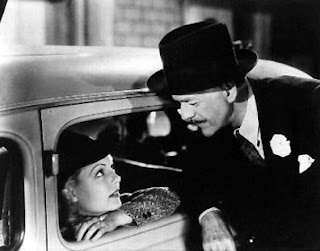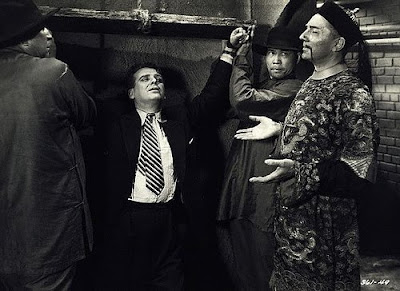Between projects for major studios in the late 1930s, Boris Karloff appeared as urbane Chinese detective James Lee Wong in five B-pictures from from Monogram. The studio, best known for quickies of questionable quality, the "Mr. Wong" films ended up being some of the best product they ever released.
(They even have the benefit of Karloff's Asian make-up not causing him to appear like an invader from Mars like he did in "Mask of Fu Manchu.")
Here, I cover all five of Karloff's "Mr. Wong" pictures.
If these sound interesting to you, I recommend getting the boxed set from VCI. It's a great way to own all six movies (the five Karloff pictures, and a sixth featuring Keye Luke as the master detective), and the price is right. (And I'm not just saying that because they asked me to write the plot summaries for the films on the menu screen. :) )
Actually, an even better value would be to pick up the "Boris Karloff: Master of Terror" 20 movie set. You'll get all five Karloff Wong pictures... and 15 other movies.
 Mr. Wong, Detective (1938)
Mr. Wong, Detective (1938) Starring: Boris Karloff, Grant Withers, John St. Polis, Maxine Jennings, Lucien Prival and Evelyn Brent
Director: William Nigh
Rating: Eight of Ten Stars
When a powerful captain of industry is found dead inside his locked office moments after police detective Sam Street (Withers) saw him standing at the window, renowned private James Lee Wong (Karloff) joins forces with the homicide squad to interpret the only clues found at the scene--tiny fragments of delicate glass. When Dayton's business partners start dying under equally mysterious circumstances, and sinister agents of foreign powers start appearing in the shadows, Wong and Street have to race against time to prevent more murders, including, possibly, their own.
"Mr. Wong, Detective" is a fast-paced, well-scripted, complex mystery with lots of twists, turns, and misdirections. The array of suspects and the way suspicion moves on and off them, the way motives come into focus and blur again, the clever way the murder weapon is triggered, and the way Wong ultimately unmasks the very clever murderer, all add up to a mystery movie that deserves more attention than it gets.
Another element that adds to the film's quality is the acting. Boris Karloff is excellent as Wong, playing a more subdued and refined character than in just about any other role he played before or after, with the way Wong sarcastically offers stereotypical "Oriental humbleness" to the face of the bad guys adding flavor to the character and comedy to the film. Grant Withers as Street is likewise excellent in his part, shining particularly brightly in the scenes with Maxine Jennings, who brings effective comic relief to the picture as his feisty girlfriend, Myra. The supporting cast and co-stars also all turn in top-quality performances.
"Mr. Wong, Detective" is a film well worth the time a fan of 1930s mysteries should devote to watching it. It's a great kick-off for the series.
 The Mystery of Mr. Wong (1939)
The Mystery of Mr. Wong (1939) Starring: Boris Karloff, Grant Withers, Holmes Herbert, Dorothy Tree and Lotus Long
Director: William Nigh
Rating: Seveven of Ten Stars
When a wealthy collector of Chinese antiques, with a list of enemies as long as a phone directory, is accidentally shot during a game of charades, brilliant Chinese detective James Lee Wong (Karloff) immediately suspects foul play. His suspicions are confirmed when it is discovered that a valuable gem has been stolen from the collector;s safe, and Captain Street of Homicide (Withers) shows up mere moments after the shooting, explaining that he was called about the murder 20 minutes before it happened. Wong, Street, and their old friend Professor Janney (Herbert) combine wits and resources to solve this most perplexing case.
The second James Wong film is not as good as the one that launched the series, but it's a solid entry that features a decent enough mystery, and a couple of clever murders (even if one is a bit of a plot cheat).
Like its predecessor, "The Mystery of Mr. Wong" provides a couple of nice changes from the detective flick standards of the day. There's Karloff's articulate portrayal of the character with a complete mastery of English. There's also the friendly relationship and the mutual respect that exists between Wong and Capt. Street, as opposed to the usual hatred and contempt that is present between cops and movie private investigators. Another nice change is that Street isn't a complete idiot--he's a competent cop who knows his job. He's just not as brilliant James Lee Wong. (Unfortunately, Street's intelligence seems to fade as the series continues and the writers guide it increasingly in the direction of a typical Monogram mystery flick.)
Karloff's performance is fine as always, and make-up that turns him Asian is again pretty decent. Withers seems a bit more comfortable as Street; in fact, all the players are closer to Karloff's level than what we saw in "Mr. Wong, Detective." (Lotus Long is particularly good in a small but important part.)
Mr. Wong in Chinatown (1939)Starring: Boris Karloff, Marjorie Reynolds and Grant Withers
Director: William Nigh
Rating: Six of Ten Stars
The famous private detective James Lee Wong (Karloff) takes it personally when a Chinese princess (Lotus Long in her second appearance as a murder victim in the series) is killed with a poison dart in his own home. He sets out to find her killer, with help from reporter Bobbie Logan (Reynolds), the latest bad-choice-of-dates for Wong's friend, Captain Street of Homicide (Withers). The trail leads to international arms-smugglers, shady bankers, con-artists, mute midgets, and tea-sipping Tong leaders, any of whom may have done in the princess.
"Mr. Wong in Chinatown", the third "Mr. Wong" mystery, is a step down from the previous two entries in the series. The plot is not as engaging as the other films, Street's new love interest/Wong's co-detective is more annoying than charming or funny, and Street himself seems to have devolved from a by-the-book detective who simply lacks Wong's ability to see clues in a different light into a typical, incompetent comedy relief detective. That's too bad, because it makes the friendship between Wong and Street seem phony--why would someone as smart as Wong want to spend time with someone as dumb as Street appears to be in this film?

There's also problems with the performances of every lead in the film. The unflappable Wong is almost too calm and detached throughout, and Karloff almost seems to be sleepwalking at times. Reynolds is gorgeous as always, but her character of Bobbie Logan is too shrill in most scenes. Withers does an okay job as Street, but the character is poorly written in this installment, and he really has very little to do.
An unengaging plot, badly handled characters, and sub par performances from the film's leads add up to making this a weak entry in the "Mr. Wong" series. Things start to pick up in the final 15 minutes or so of the movie, and these manage to keep it on the high side of average... but only barely. It still remains a disappointment when compared to the first two movies and the "Phantom of Chinatown" prequel.
Doomed to Die (aka "The Mystery of Wentworth Castle") (1940)Starring: Boris Karloff, Marjorie Reynolds, Grant Withers, William Stelling, and Catherine Craig
Director: William Nigh
Rating: Four of Five Stars
When shipping magnate Cyrus Wentworth is murdered, Captain Street (Withers) immediately arrests the only possible suspect: The disgruntled fiance of his daughter (Stelling), the only person in the room with him when he died. Street's girlfriend, reporter Bobbie Logan (Reynolds), is convinced the case is not as simple as Street believes, and she hires San Francisco's leading private detective James Lee Wong (Karloff) to clear the young man and Cyrus's daughter (Craig) of any suspicion, and to find the true killer. Complications soon emerge, as evidence of connections between Wentworth, Tong criminal activity, and the mass-murder of 400 passengers onboard one of Wentworth's ships are revealed... and Mr. Wong himself comes under fire from gangsters and killers.
"Doomed to Die" is the weakest of the Mr. Wong features. It's sloppily written, featuring a badly structured story that's moves slowly through muddled twists and turns to a fairly predictable conclusion. Street is written like an utter moron, and Wong solves the case more through luck than intelligent investigation. (He also seems to have developed a mysterious ability to show up anywhere and everywhere the plot requires him to be, even if there's no particular reason for him to be there other than plot dictates.)
An effect of the bad script is that Withers is mostly wasted here. His character is relegated to the role of buffoon. Karloff turns in another decent portrayal of Mr. Wong, but the bad script gives rise to many unintentional comedic moments, all relating to his uncanny ability to appear at windows and on fire escapes.
One upside is that the Bobbie Logan character is a little less annoying in this installment than she was in her first appearance (in "Mr. Wong in Chinatown"), and Reynolds' performance is thus a real bright spot in the film... although her good looks certainly help to enliven all the Wong features she appears in! The supporting cast is also decent enough.
Out of all the "Mr. Wong" features, this is one that interested viewers might safely take a pass on.
 The Fatal Hour (aka "Mr. Wong at Headquarters") (1940)
The Fatal Hour (aka "Mr. Wong at Headquarters") (1940) Starring: Boris Karloff, Grant Withers, Marjorie Reynolds, Frank Puglia, and Charles Trowbridge
Director: William Nigh
Rating: Six of Ten Stars
When a common close friend is murdered while investigating smuggling on the San Francisco waterfront, private dective James Lee Wong (Karloff), crime-beat reporter Bobbie Logan (Reynolds), and Captain Bill Street of Homicide (Withers) devote all their skills to finding the killer. Their respective investigations soon zero in on a failing retailer of imitation Chinese antiques, a waterfront nightclub being run by a shady gambler (Puglia), and the obscure connections that exist between them. Soon more bodies start to pile up, and if Wong can't solve the case, he may become a victim himself... and how can Wong hope to catch a killer who can commit murder within the sqaud room of Street's homicide department?
"The Fatal Hour" is another solid entry in the "Mr. Wong" series. The mystery is a multilayered one that's well thought out, and the performances are decent all around. It's not as good as "Mr.Wong, Detective" or "The Mystery of Mr. Wong", but its entertaining enough and it almost manages to reach the greatness that was present at the start of the series.
What keeps this film from rising to the level of the series' best entries is the overwrought nature of the third murder. While its arrangement and solution is as clever as anything you'll find in a Agatha Christie novel, it felt too far-fetched in the context of the rest of the film, and even the rest of the Mr. Wong series. (And this is a series where the murder weapon was triggered by police sirens in a previous film.)

























.jpg)






.jpg)
